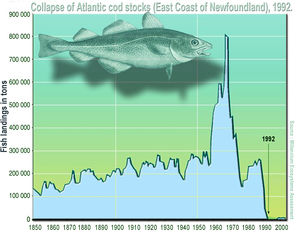Over-harvesting
Over-harvesting means taking more from the land (or sea) than it can replace. It includes extreme farming, grazing, fishing, and using fresh water.

Over-harvesting is harmful in the long term. Forests or wetlands are hard to replace. Damage to nature hurts animals and humans. Most wetlands are damaged by overuse as a source of drinking water, and are sometimes drained to make farmland or land for building. A thriving and diverse ecosystem is destroyed.
Over-harvesting also applies to animals. Population numbers may drop as a result, and species may become extinct. Overfishing is a typical example. Nowadays, you can only fish, shoot deer or birds at certain times of the year. The season when they mate, reproduce and lay eggs or have the young are protected. Areas of especial natural beauty or scientific interest are also protected. Now, in the United Kingdom, it is illegal to take bird eggs.
One thing which acts against conservation is the overpopulation of the world. The greatest single reason why the world loses forests is that some people want the land for other purposes. A few people gain, but everyone shares the cost. This is called the tragedy of the commons.
References
change- ↑ Frank, Kenneth T. et al 2005. (2005). "Trophic cascades in a formerly cod-dominated ecosystem". Science. 308 (5728): 1621–1623. Bibcode:2005Sci...308.1621F. doi:10.1126/science.1113075. PMID 15947186. S2CID 45088691.
{{cite journal}}: CS1 maint: numeric names: authors list (link)